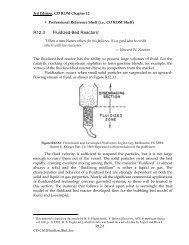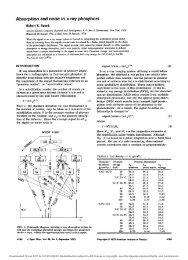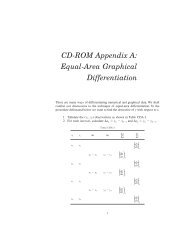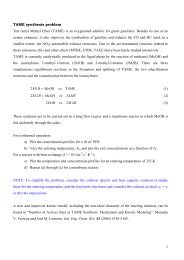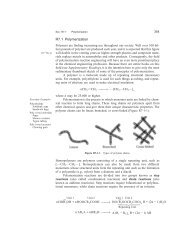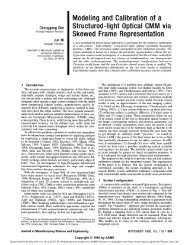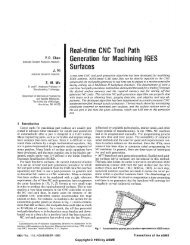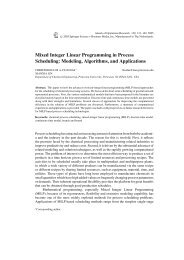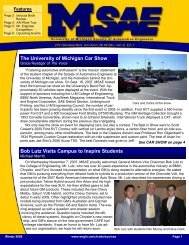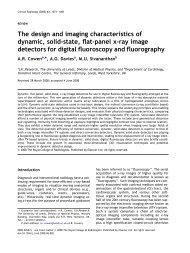Conceptual framework: What do you think is going on?
Conceptual framework: What do you think is going on?
Conceptual framework: What do you think is going on?
You also want an ePaper? Increase the reach of your titles
YUMPU automatically turns print PDFs into web optimized ePapers that Google loves.
03-Maxwell.qxd 10/1/2004 3:13 PM Page 62<br />
62 QUALITATIVE RESEARCH DESIGN<br />
number of things, without seriously attempting to come up with alternative<br />
models that would make the same (or better) predicti<strong>on</strong>s. For example,<br />
Lave and March make an assumpti<strong>on</strong>, a widespread <strong>on</strong>e in modern<br />
Western societies, that friendship <str<strong>on</strong>g>is</str<strong>on</strong>g> necessarily based <strong>on</strong> comm<strong>on</strong> character<str<strong>on</strong>g>is</str<strong>on</strong>g>tics—shared<br />
interests and values. An alternative model would be<br />
<strong>on</strong>e that aban<str<strong>on</strong>g>do</str<strong>on</strong>g>ns th<str<strong>on</strong>g>is</str<strong>on</strong>g> assumpti<strong>on</strong>, and postulates that friendship can be<br />
created by interacti<strong>on</strong> itself, and not necessarily by comm<strong>on</strong> character<str<strong>on</strong>g>is</str<strong>on</strong>g>tics<br />
(see Example 3.1).<br />
STOP AND THINK. <str<strong>on</strong>g>What</str<strong>on</strong>g> tests could<br />
d<str<strong>on</strong>g>is</str<strong>on</strong>g>tingu<str<strong>on</strong>g>is</str<strong>on</strong>g>h between these two models?<br />
One possible test would be to investigate the beliefs, interests, and values<br />
of freshman <str<strong>on</strong>g>do</str<strong>on</strong>g>rmitory students at both the beginning and the end of<br />
the year, to see if pairs of friends c<strong>on</strong>s<str<strong>on</strong>g>is</str<strong>on</strong>g>tently had more in comm<strong>on</strong> at the<br />
beginning of the year than did pairs of students in the same <str<strong>on</strong>g>do</str<strong>on</strong>g>rm who did<br />
not become friends. (Determining th<str<strong>on</strong>g>is</str<strong>on</strong>g> similarity at the beginning of the<br />
year addresses a possible alternative explanati<strong>on</strong> for greater similarity of<br />
beliefs and interests within friendship pairs—that th<str<strong>on</strong>g>is</str<strong>on</strong>g> similarity <str<strong>on</strong>g>is</str<strong>on</strong>g> a<br />
result of their friendship, rather than a cause.) If <str<strong>on</strong>g>you</str<strong>on</strong>g> find that pairs of<br />
friends did not c<strong>on</strong>s<str<strong>on</strong>g>is</str<strong>on</strong>g>tently have more in comm<strong>on</strong> than pairs of n<strong>on</strong>friends,<br />
then Lave and March’s model seems less plausible (at least without<br />
modificati<strong>on</strong>), because it predicts that friends will have more in<br />
comm<strong>on</strong> than n<strong>on</strong>friends. My alternative model <str<strong>on</strong>g>do</str<strong>on</strong>g>es predict the observed<br />
result, and therefore would deserve further c<strong>on</strong>siderati<strong>on</strong> and testing.<br />
Eventually, <str<strong>on</strong>g>you</str<strong>on</strong>g> might develop a more complex model that incorporates<br />
both processes.<br />
All of the tests described previously (and the standard approach to<br />
model testing in general) are based <strong>on</strong> variance theory—measuring<br />
selected variables to see if they fit the model’s predicti<strong>on</strong>s. However,<br />
there <str<strong>on</strong>g>is</str<strong>on</strong>g> a much more direct way to test the model—investigate the actual<br />
process, rather than just its predicted c<strong>on</strong>sequences (Menzel, 1978,<br />
pp. 163–168). For example, <str<strong>on</strong>g>you</str<strong>on</strong>g> might <str<strong>on</strong>g>do</str<strong>on</strong>g> participant observati<strong>on</strong> of<br />
student interacti<strong>on</strong>s at the beginning of the year, looking at how friendships<br />
originate, or interview students about how they became friends with<br />
other students. Th<str<strong>on</strong>g>is</str<strong>on</strong>g> real<str<strong>on</strong>g>is</str<strong>on</strong>g>t, process-oriented approach to model testing <str<strong>on</strong>g>is</str<strong>on</strong>g><br />
much better suited to qualitative research than <str<strong>on</strong>g>is</str<strong>on</strong>g> predicting outcomes<br />
(Maxwell, 2004a, 2004c).




